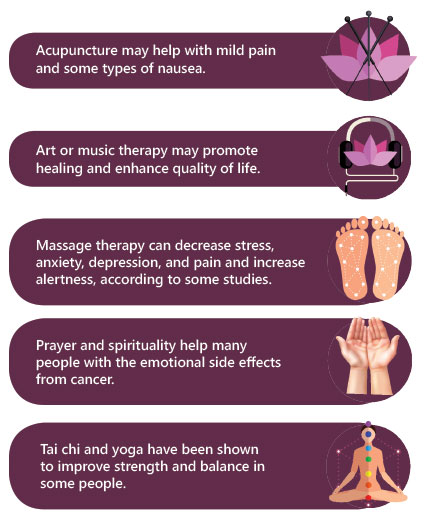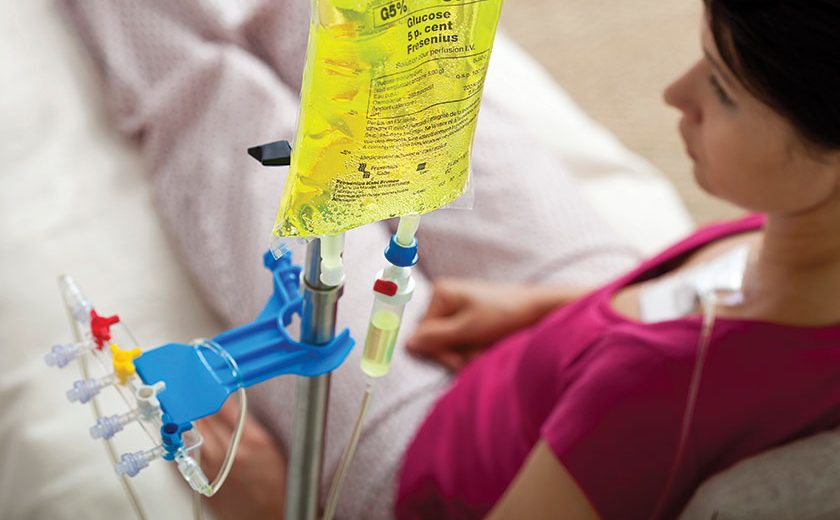The terms “alternative,” “complementary,” and “lifestyle” medicine are used to describe many kinds of products, practices, and treatments that are not part of standard or traditional medicine.
Alternative therapy refers to non-standard treatment used in place of standard treatment, while complementary therapy usually means methods used along with standard treatment. Lifestyle medicine is a newer field that describes its approach as preventing and treating illness through healthy eating, physical activity, and other healthy behaviours without the use of medicine.
In some cases, complementary methods can help cancer patients feel better when used alongside standard treatment and with the advice of a healthcare provider to reduce the symptoms or side effects of cancer.
Alternative and complementary therapies are often appealing because they use your own body, your own mind, or things that may be found in nature. But sometimes these methods wrongly claim to prevent, diagnose, or treat cancer even when they have not been proven to work through scientific testing. For example, there is a concern that taking antioxidants (which includes vitamins A, C and E, and selenium) while having chemotherapy or radiotherapy could actually protect cancer cells from being damaged by the cancer treatment. There is not enough evidence to know whether antioxidants are helpful or harmful in this situation. We need more research to help us learn the best ways to use complementary therapies.
In the worst cases, some alternative or complementary therapies may be dangerous or even deadly. Some may also interfere with how standard cancer treatment works. If you’re thinking about using any non-traditional therapy, it’s important to first discuss it with your health care team.
How Complementary Medicine Can Be Helpful And Safe
Some complementary methods have been studied and shown to help people feel better while they’re undergoing standard cancer treatment under a doctor’s care. Examples might include meditation to reduce stress, peppermint or ginger tea for nausea, or guided imagery to help relieve stress and pain during medical procedures.
Many complementary treatments are unlikely to cause harm and won’t interfere with your cancer treatment.
Here are some examples:

It has been well established by increased genetic analysis of various cancers that each case of cancer is unique and that there are no two patients which would have identical targets for treatment. The common model of cancer treatment uses algorithms tied to tissue type and location of the cancer which divide treatment for patients based on it.
Warning signs
If you are thinking about using any method instead of standard evidence-based medical treatment, it is important to talk to your health care team first. And watch out for these warning signs:
- Be suspicious of any treatment that says it can cure cancer or other difficult-to-treat diseases (such as chronic fatigue, multiple sclerosis, AIDS, etc.). It’s important to remember that those claims have not been proven.
- Be suspicious of any treatment that claims to offer benefits with no side effects. Even herbs and vitamins have possible side effects. If the treatment is marketed as having no side effects, it has likely not been studied in rigorous clinical trials, where side effects would be seen.
- Be suspicious of promoters who attack the medical or scientific community or who tell you not to use standard or traditional medical treatment.
- Beware of treatments you can get in only one clinic, especially if that clinic is in a country with patient protection laws, that are not strict.
- Beware of terms such as “scientific breakthrough,” “miracle cure,” “secret ingredient,” or “ancient remedy.” Beware of personal stories that claim amazing results but provide no actual scientific evidence.
- Find out about the training and education of anyone supporting the treatment or using it to treat you. Find out if they are medical doctors and whether they are experts in cancer care or complementary medicines.
- Find out whether scientific studies or clinical trials have studied this treatment in people (not just animals), and what side effects have been reported. Find out if the treatment could harm you or interact badly with your other medicines or supplements.
- Learn whether the findings have been published in trustworthy journals after being reviewed by other scientists who are experts in the same field, or if they have been promoted only in the mass media, such as books, magazines, the internet, TV, infomercials, and radio talk shows.
 Dr. Malwinder
Dr. Malwinder
Clinical (Medical & Radiation) Oncology,
Sri Kota Specialist Medical Centre


